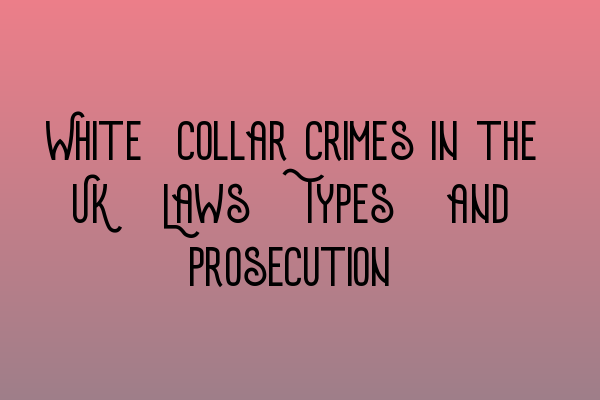White-Collar Crimes in the UK: Laws, Types, and Prosecution
Welcome to the SQE Criminal Law & Practice Law UK blog! Today, we will be discussing one of the most pressing issues in the world of business and finance – white-collar crimes in the UK. Although often associated with non-violent crimes, white-collar crimes can have a significant impact on individuals and society as a whole. As solicitors and legal experts, it is essential to understand the laws, types, and prosecution of such crimes in order to provide the best possible legal representation.
The Definition of White-Collar Crimes in the UK
White-collar crimes refer to non-violent offenses committed by individuals or organizations in the course of their professional or business activities. These crimes typically involve deceit, fraud, or violation of trust and are often motivated by financial gain. Examples of white-collar crimes include:
- Corporate fraud – such as accounting fraud, insider trading, or bribery within a company.
- Money laundering – the process of disguising the origins of illegally obtained funds.
- Securities fraud – actions that deceive investors or manipulate the financial markets.
- Embezzlement – the misappropriation of funds entrusted to one’s care, often by an employee.
These are just a few examples, and white-collar crimes can take various forms. It is important for solicitors to be familiar with the different types of offenses and the specific laws that govern them.
Laws Affecting White-Collar Crimes in the UK
White-collar crimes are regulated by a number of laws and statutes in the UK. The most prominent legislation relating to such offenses is the Fraud Act 2006. This act provides a comprehensive framework for prosecuting individuals or organizations involved in fraudulent activities, including false representation, failure to disclose information, and abuse of position.
Another important piece of legislation is the Money Laundering Regulations 2017. These regulations impose obligations on businesses to implement anti-money laundering measures and report suspicious transactions.
It is also crucial to be familiar with laws pertaining to corporate governance and accounting practices, such as the Companies Act 2006 and the Financial Services and Markets Act 2000, as these provide the guidelines for ethical and transparent business conduct.
Prosecution and Penalties
When it comes to prosecuting white-collar crimes, the Crown Prosecution Service (CPS) plays a vital role. The CPS is responsible for determining whether there is enough evidence to bring a case to court and for prosecuting cases on behalf of the state.
If an individual or organization is found guilty of a white-collar crime, the penalties can vary depending on the severity of the offense. They may include fines, imprisonment, confiscation of assets, or disqualification from acting as a director.
It is important to note that white-collar crimes often involve complex financial transactions and require expert legal representation. As solicitors at SQE Criminal Law & Practice Law UK, we are dedicated to providing the best legal advice and assistance to our clients involved in white-collar crime cases.
